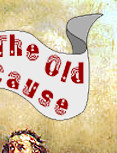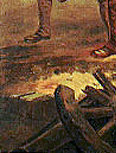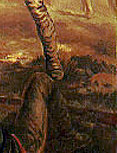This
why Hannibal’s feat was so great: imagine a guy slogging
a big mob of Carthaginian late-term abortionists,
elephants, and Celtic auxiliaries through the Alps
just so he could ravage Italy for nine or ten years.
Wow. Of course his supply lines got a bit overextended
and he was eventually mopped up by Roman forces operating
as guerrillas, but that’s another story, whose lesson
will be clear to all who reside outside Foggy Bottom
and the Pentagon. Maybe more firepower and high technology
would have saved Hannibal, if not his brother.
THOSE
MONTAGNARDS ARE UPPER-GERMAN WILHELMS NOW
It
was the European Romantic Movement that changed our
perception of mountains. This has something to do
with Shelley, Byron, and their hangers-on and groupies,
who spent some time in old fixer-upper castles in
Switzerland. This experience, if we are to believe
that quirky film, The
Haunted Summer, inspired Mary Shelley to write
Frankenstein,
when her time would have been better spent filing
for divorce. Anyway, the Romantics repackaged mountains
as challenging if mysterious places, where your health
and general outlook would take on new life, unless
you fell a few hundred feet while grooving on the
ambience. Mountaineers – who had learned how not to
take such unneeded falls – were, therefore, admirably
keen and sharp-witted folk, healthy as could be, and
their customs well worth looking into. One thinks
of Heidi and those criminally healthy Austrian
girls in Herr Haider’s ethnocentric posters of which
we’ve been hearing.
RISE
AND FALL OF THE WORLDWIDE YODELING CONSPIRACY
As
the interest in montagnard studies kindled by the
Romantics grew, a canny troupe of Alpine yodelers
– the Rainer Family – hit the road in the 1840s, performing
in the British Isles and North America, bringing octave-leaping
to large and appreciative audiences. Rainer Family
imitators went down to Australia and popularized the
form there. A few decades later, Mr. Edison made recorded
music possible and clever promoters in Tin Pan Alley
cried, "There’s gold in them thar hillbillies!"
The rest is history of popular culture, with several
conferences scheduled.
The
point is that, owing to the Rainers and Rainer-imitators,
yodeling was on hand, ready to become an important
feature of early "hillbilly" or Country-and-Western
music.1 The same thing
happened Down Under and Australian c&w singers
kept yodeling about twenty years longer than did the
Americans. Some like Rex Dallas and Owen Blundell
still do. Slim Whitman – a near-yodeler from Florida
– had to move to England to get away with it. (Rent
Mars
Attacks! for the results.) "This is how
culture works," as someone once said, trying
to explain how Jimmy Driftwood, a presumably Protestant
Arkansas folksinger came to write that great song
about St. Brendan the Bold’s premature discovery of
America.
Postmodernists
shift between high excitement and cosmic indignation
when they consider the constituent elements of country
music – the Hawaiian guitar, the African banjo, European
stringed instruments, Celtic melodic concepts, etc.
Very diverse. Me, I prefer just to listen to it. And
what about those south Texas Germans, who are the
likeliest source of the accordions which became central
to Mexican music (Conjunto and Norteno)?
They have a lot to answer for. For my money, the only
people who can use those damned squeeze-boxes plausibly
are the Scots, and they just deploy them as reduced
bagpipes. Go figure. Canadian accordion-lovers can
quit reading at this point. You have more to worry
about, anyway. Look who’s next door.
JACOBITES,
SAINTS, WILY PATHANS, AND WILLIAM TELL
So
the Romantics made everyone feel better about mountains
and mountain folk. This side of the water, Horace
Kephart’s book, Our
Southern Highlanders (1913) took a friendly
look at Appalachia, launched a few fallacies, like
the claim that folks there speak "Elizabethan
English" (a half-truth at best). The Hoosier
Hotshots’ famous song, "Those Hillbillies Are
Mountain Williams Now" hurried the friendlier
trend along. Homer and Jethro, Minny Pearl, Stringbean,
and Lonzo and Oscar soon followed. The last two lately
observed that today’s audiences don’t understand pickin’
and grinnin’ – especially the grinnin.’ Something
important has been lost.
The
Romantics did not entirely neglect the military dimension
of mountaineering. Nor did those who migrated to mountains.
It seems likely that Brigham Young said "This
is the place" when and where he did, precisely
because it looked like a defensible position. My Swedish
forebears probably thought it looked pretty good,
too, especially after slogging across a thousand-some
miles of bad land with hand-carts in 1862. They somehow
managed to avoid conscription into Mr. Lincoln’s Grand
Army, with the result that they never had to fight
alongside – or against – the hillbilly side
of my family (those hillbillies were somewhat at odds
with each other in the 1860s). And, then, nobody bothered
them much in Utah. Everybody else was fighting but
no one invaded Utah. I guess they were too busy. I
think the mountains may have helped. Nobody invades
Switzerland, either, except for lawyers.
REPUBLICAN
VIRTUE, ABSENT REDNECKS, AND FREE SOCIETIES
This
brings me to what could be called the Absent Red-Neck
Problem – but first, some deeper historical background.
The great historian William Hardy McNeill points out
"an alternating rhythm in Mespotamian political
history. A conqueror from the margins of civilized
life, like Sargon, might indeed establish an effective
central authority; but after a few generations, the
conquering group was likely to abandon its military
habits in favor of the softer and more luxurious ways
of the cities. In turn, relaxation of military discipline
and decay of the warrior spirit opened a path for
either revolt from within or fresh conquest from the
margins."2
Well,
it’s not our job, here, to cry for former conquerors,
anymore than Argentina should cry for Evita, and the
whole cycle was likely a bit awkward for the civilians
– members of the third estate – who got caught in
the crossfire. This sort of thing might take only
three generations to unfold, as is sometimes the case
with the great American fortunes. That very sharp
fellow Ibn Khaldn (1332-1406), the founder (after
Aristotle) of political sociology, wrote of a similar
cycle in Arab history.3
The
key seems to be that devil-term "luxury"
and bringing it up puts us back into the running debate
between classical liberalism and classical republicanism,
which has been haunting us since at least the 18th
century. This is true, even this side of the water,
since the ideology of the American Revolution drew
heavily on both political "languages." Over
here, we like to think that we achieved a stable and
lasting synthesis.4 Maybe not.
FREEDOM,
VIRTUE, HIGHLANDERS, KLEPHTES, AND REDNECKS
One
little republican doubt hung around in liberal circles
into the 19th century. It broke out in
the debate between French liberals Benjamin Constant
and Charles Dunoyer in the 1820s. Constant questioned
Dunoyer’s thoroughgoing utilitarianism, which imagined
there were economic solutions to all problems. As
Ralph Raico writes, Constant threw light on "a
certain inner contradiction in the free society, which
can only be compensated for by bringing into play
anti-utilitarian forces, such as religious faith...."
The problem was that freedom’s very success in bringing
about prosperity tended to lessen the number of those
– Greek Klephtes, Scottish highlanders –
who have the skills and personal virtù
with which to defend freedom and the free society.5
The Klephthes, of course, were mountain bandits, whose
role in liberating Greece from the Turks was fresh
in the memory of European liberals; and in the early
19th century, the British Establishment
still worried overtime about the highlanders’ Jacobite
leanings. I suppose I should at least mention the
"wily Pathans," other mountaineers who gave
the Brits no end of trouble on the northern frontiers
of India
Here
we have what I call the "absent redneck problem,"
but Constant, of course, put it much more elegantly.
Republicanism set it up as "luxury" versus
republican "virtue." As Raico puts it: "For
Constant, the growing possibility of participating
in the enjoyments offered by modern society was a
powerful attractive force. But recent experience showed
that certain sacrifices had been necessary to fight
tyranny. Who had fought Napoleon tooth and nail? Was
it the bourgeoisie of Paris, who even under Napoleon
were not deprived of their search for pleasure? Or
was it the peasants of Russia and Spain, who, having
nothing to lose, risked their lives to throw off foreign
domination?"6
SOCIOLOGY,
STRATEGY, AND MOUNTAINS
In
the American heartland there are many who fear that
a dramatic assault on our freedoms might find many
of the "conservative" literati AWOL, if
not actually helping the wrong side. They could be
wrong, I guess, and the Mothers may march all they
wish, but the heart of the Second Amendment debate
is here. Mountaineers, as people experiencing practical
independence, take on symbolic importance in the present
context. And imagine living in such an environment
without firearms.
It
may be that highlanders, rednecks, and their sociological
equivalents – drawn, one imagines, from the peasants
and petty bourgeoisie – are needed to preserve liberty.
Someone told me as far back as 1978, "Libertarians
have a lot of theory, but the rednecks have the practical
skills." It follows that the scholars and the
rednecks should be friends. Second Amendment and (certain)
flag issues might be central in building a "coalition
to end coalitions" – to paraphrase Hank
Junior, himself a bit of a social theorist. And, speaking
of social theory, there is – though some would
hesitate to name in polite company – Jim Goad’s
The
Redneck Manifesto (1997).
Certainly,
the poor demonized bubbas have no reason to turn to
Al Gore and little enough to support George Dubbya.
Here is a non-Marxist "historical bloc"
the Left doesn’t even want. Someone has to rally them.
Why not libertarians and antiwar conservatives?
MOUNTAINS
MAY NOT BE ENOUGH
But
to return briefly to those mountains alluded-to earlier,
historical experience suggests that when one is up
against a determined and patient enemy, mountains
by themselves may not be enough. In time, the enemies
of local freedom – including, surprisingly enough,
our own Uncle Sam – can put their people in the mountains,
on the ground, in sufficient numbers to overcome the
mountaineers’ geographical advantage. But for a while,
at least, the "peculiar" people on the Wasatch
Front did things their way. D.W. Meinig writes that
the "Mormon region took on a human geographic
quality unlike anything in surrounding areas. It was
a homeland in a much more profound sense, with a homogeneity,
unity, order, and self-consciousness unequaled in
any other North American region and rivaled only by
that other peculiar self-conscious nation of North
America along the lower St. Lawrence."7
This
may slight the status of the South as a captive nation
within the federal plantation, but no matter. Certainly,
Utah wasn’t for everyone – and still isn’t, I
suppose. Those who prate of villages and communities
seldom like actually existing ones. They think of
them as bastions of reaction in need of kindly but
firm reconstruction by the usual suspects. Faced with
people who believe in something and who act on their
beliefs, the poor ACLU works overtime in Utah to bring
their benighted neighbors into the 20th,
soon to be the 21st, century.
This
is doubtless why Utah "public" TV was so
goggled-eyed last month, when it presented a series
on the changing – more lovable, more "diverse"
– Utah now unfolding under the watchful eyes of the
international/national elite. Still, some of the older
order remains. In Utah, even the ACLU quotes Brigham
Young – if only as a provocation.
Notes










